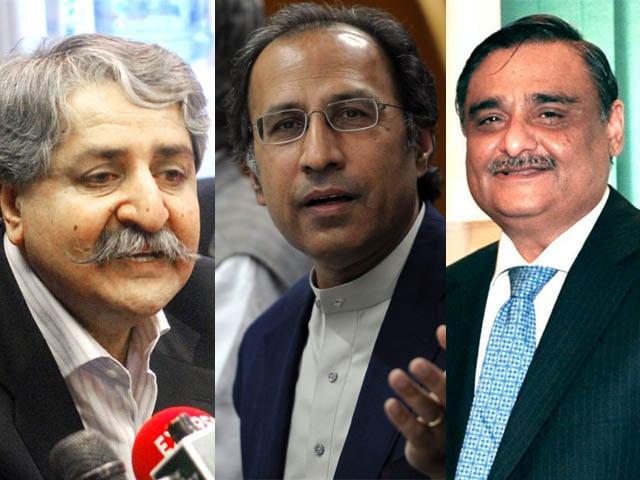Energy crisis: Three ministers, no political courage
Government refuses to make a decision on power tariff hikes at high-level meeting.

Three of the country’s highest-ranking economic decision makers could not bring themselves to take the tough but necessary decisions to increase power tariffs or resolve the energy sector’s inter-corporate circular debt issue, in their second inconclusive meeting on the matter on Monday.
Finance Minister Abdul Hafeez Shaikh, Water and Power Minister Naveed Qamar and Petroleum Minister Asim Hussain were unable to summon the political courage to raise power tariffs, despite the government’s commitment to the International Monetary Fund to reduce subsidies to the power sector.
The ministers also appeared to not know the precise figure of circular debt in the energy sector, which has financially paralysed the sector and is the single biggest cause of power producers not being able to generate enough electricity.
“The increase in power tariff could not be decided upon and the circular debt figure could not be firmed up too as there are still vague figures,” said the petroleum minister.
The meeting had been held to make a decision on whether or not to raise power tariffs by 2% and also determine the government’s policy on how to handle the financial crisis in the energy sector. But government officials seemed unwilling to take a move that would likely be highly unpopular.
“The good thing is that we have started meeting again and are trying to bring the issues near a conclusion,” said Nadeemul Haque, deputy chairman of the Planning Commission after the meeting.
The government estimates the difference between the power sector’s cost of production and the revenues it can expect from billing consumers at Rs121 billion.
In order to bridge this gap, the government can either increase prices by 12% or it can increase the bill collection efficiency of power distribution companies, which lose an average of 22% of the power generated in the national grid to line losses (both through poor infrastructure and theft.)
Meanwhile, the government seems unable to determine the size of the energy sector’s inter-corporate circular debt – the amount of money the energy companies owe each other because of the government’s failure to make subsidy payments on time.
Some estimates suggest that the circular debt may be as high as Rs141 billion but the government seems unsure. This amount is in addition to the Rs301 billion that the government has in a power holding company, over which it has to pay Rs42 billion in interest every year.
The finance ministry claims it injected Rs120 billion in June into the energy sector to lower the circular debt. Yet the government has been unable to decide which outstanding liabilities to include in the circular debt, according to one official present at the meeting.
The government also discussed ending subsidy payments to the Karachi Electric Supply Company, but refrained from making a final decision on the matter since doing so would increase power outages in the country’s financial, commercial and industrial capital.
Published in The Express Tribune, July 26th, 2011.






1724319076-0/Untitled-design-(5)1724319076-0-208x130.webp)












COMMENTS
Comments are moderated and generally will be posted if they are on-topic and not abusive.
For more information, please see our Comments FAQ